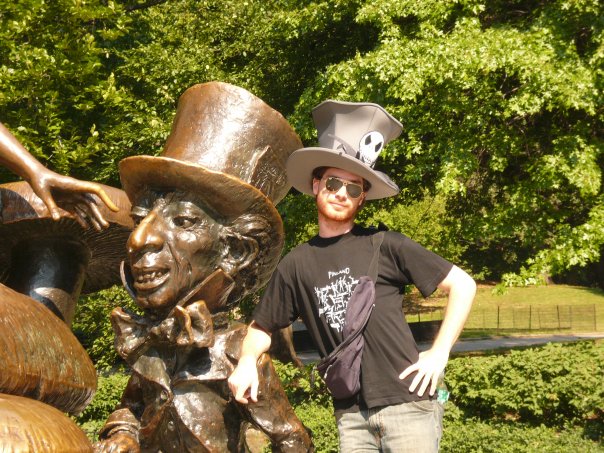Jacopo Tagliabue
From Santa Fe Institute Events Wiki
Hi all,
This is “my profile release 2.0”, including exciting updates such as a new profile picture and answers to Dan’s questions as they are posted in the homepage.
I am student of philosophy at San Raffaele University, Milan, Italy. I am a jr. researcher in “Experimental and Applied Epistemology” @ CRESA, and a jr. researcher in “Life-Span Extension Methodologies” @ iLabs. I am currently figuring out what these strange tags actually mean.
My B.A. dissertation was on foundational issues in ontology and I am still spending part of my life convincing myself that I do not exist. In my M.A. dissertation I’d like to shed some new light on the concept of “complexity” borrowing tools from formal ontology and philosophical logic. I strongly feel that a qualitative theory of information is needed to make sense of how complexity emerges from low-level simplicity, but unfortunately I now have just some vague clues of how such a theory may look like. I hope CSSS will help me figuring out if all this work makes more sense than the previous one.
'simplex sigillum veri' has always been my favorite motto since my first B.A. year, but I think I’ll switch to 'complex sigillum veri' before CSSS.
Now Dan’s questions:
1. What are your main interests?
I am at the very beginning of a project in formal ontology whose aim is to find a suitable logical framework for the description of complex systems dynamics – more or less a formal version of what Melanie Mitchell calls an “explanatory vocabulary for decentralized computation” in her book Complexity. The framework builds on works by Achille Varzi, Barry Smith and others on space-time, objects and events representation, but tries to extend their insights with a brand-new qualitative theory of information. Apart from computation and high-level general theory, I am very keen (but without experience) on computational models in social scenarios, everything ranging from crime and cheating (probably because of my obsession with Batman :) ) to innovation and market competition.
2. What sorts of expertise can you bring to the group?
I have been trained as a metaphysician for the most part of my life, so I am supposed to be skilled in “philosophical reasoning”, that is analytic rigor, clarity of exposition, a sane scepticism (and, of course, lots of jokes). I may help with methodological and foundational issues and, if needed, introduce others to some aspects of (both formal and informal) ontology and philosophical logic. Actually, I have been exposed to several disciplines (statistics, microeconomics, artificial intelligence, cognitive sciences), but I wouldn’t consider myself an “expert”.
3. What do you hope to get out of the CSSS?
New tools, new insights, hands-on experience on complex systems models, good suggestions on how to build “a new kind of science”. And, more important, new people to work with, sharing my values and my interests.
4. Do you have any possible projects in mind for the CSSS?
I hope that a CSSS by-product would be important insights on the very nature of information, what it is and how it is processed in complex adaptive systems. However, I hope my main project there will give me the chance to gain experience on computational models: as I’ve already said, I am really attracted by topics in social sciences, but I will be glad to consider (and be inspired by) any other subject that sounds interesting.
Tutorials
Looking for someone that tells me something on...
- physics (everything, preferably in a for-dummies fashion)
- orthodox (that is, non-evolutionary) game theory (something beyond the basics)
- agent-based models (how to do them in practice)
- quantitative information theory (something beyond the basics)
Maybe I can tell you something on...
- classical logic, modal logic, paraconsistent logic
- review of some meta-logical results (Goedel incompleteness theorem, Tarski work on truth, etc.) and a (open) discussion of their alleged consequences (theory of everything, the impossibility of Artificial Intelligence, etc.)
- classical (David Lewis) and evolutionary (Brian Skyrms) approaches to social conventions
- formal ontology: tools, scope, applications
- a bit of the philosophy behind everything above mentioned
Contacts
Feel free to contact me using
tagliabue.jacopo@gmail.com or
jacopo.tagliabue@diagramma.it.
Look forward to meeting you (as you easily guess, I am obsessed with Jack Skeleton too)

